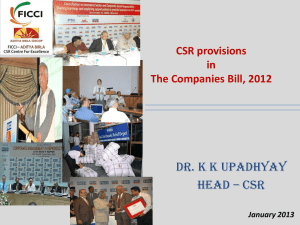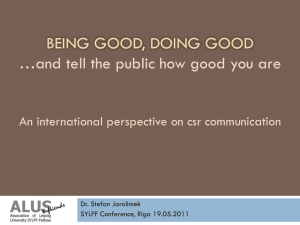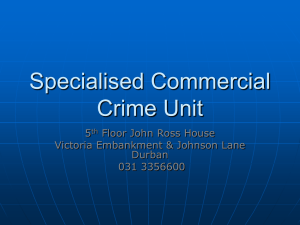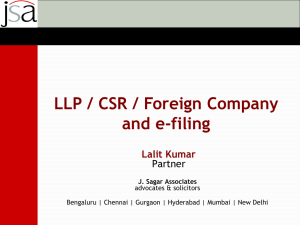Revenue Protection Process Options with Relation to Smart
advertisement
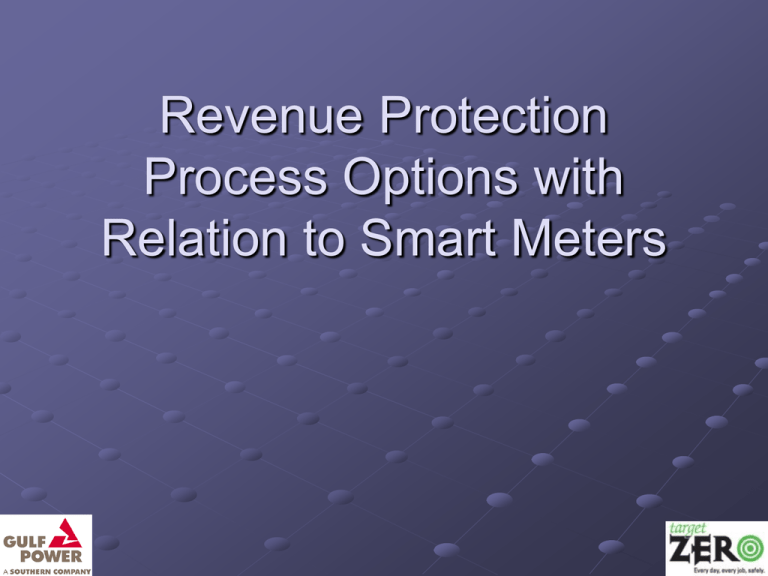
Revenue Protection Process Options with Relation to Smart Meters Mission Statement A cross functional team was formed to review the current revenue protection process at Gulf Power Company and the potential impact the implementation of Smart Metering would have on this process. The team’s mission was to utilize historical data, first hand knowledge of the function and data gathered from Gulf Power and sister companies to recommend options regarding the revenue protection process in the future at Gulf Power Company. Team Members T. Lynn Smith – Staff Investigator Panama City District Ron Grissom – Fort Walton Customer Service Supervisor Ricky Martin – Panama City Customer Service Team Leader Pete Rose – Staff Investigator Fort Walton District Gretchen Brubaker – Human Resources Paul Talley – Metering Services Supervisor Pine Forest Carrie Wyatt- Customer Service Rep Corporate Security Jennifer Ness – Dispatch Operator Pine Forest Bobby Cutler – Field Service Representative Pensacola Becky Brewer – Customer Accounting Operations Bill Goodwin – Customer Service Associate Call Center EEI estimates that a utility’s loss due to theft runs between .5% to 2% of annual revenue. In 2009, Gulf had annual revenues of 1.1 billion dollars. This would result in a loss between 5.5 to 22 million. In 2009, Gulf Power’s Security Department identified $183,808 in theft, which is .0017% of the 2009 annual revenue. Gulf Power’s recovery rate of the identified theft was 32%. With recommended improvement changes, the identified theft and recovery percentages can be increased. Current Process The Field Service Representatives (FSR) work approximately 98% of possible theft cases as a Check and Seal order in ARMS. Security Investigators work approximately 2% of the theft cases on a Revenue Protection order. There will be approximately 15 to 45 days of unauthorized usage on a meter, because of the reading cycle, priority to work order, and man-power. Completed orders are referred to the Security’s Customer Service Representative (CSR) to calculate the amount to collect and note the account in CSS. Security’s CSR creates a Diversion Investigation Management System (DIMS) case on the completed Check and Seal orders. The Investigator receives the FSR’s completed Check and Seal order to determine who is responsible. This is accomplished by a phone call or visit to the address. The Investigator will complete the DIMS case and forward the information back to the Security CSR. The Security CSR will close and file the DIMS case and update the case if the customer pays. Recovery is attempted when future customer contact is made. If customer sets up an active account before account is noted, Security CSR will bill the responsible customer the identified charges. Drawbacks to the Current Process High labor cost of working a case (reduce Investigator’s involvement). Revenue Protection duties are often shifted to a lower priority (wire theft, storm duty). Orders are not worked in a timely manner. Accounts are not being noted in a timely manner. Multiple organizational owners. Insufficient resources Labor Cost related to Revenue Protection (current) Labor cost (includes salary, benefits, .. ; not including transportation, IT and other overheads) of employees associated with revenue protection duties are: Sr. FSR $31.84 per hour. Sr. CSR $34.87 per hour. Staff Investigator $60.62 per hour. Average time spent on a case is: FSR at 15 minutes. CSR 15 minutes. Investigator 30 minutes. In 2009, the cost to work, calculate, and investigate 1,673 cases that were worked by FSRs and forwarded to the Security Department (Investigator and Security CSR) was $78,614. The cost for investigators to work 300 cases was $11,709. Cost Summary In 2009, 1,973 cases cost $92,323. The amount collected was $60,258. For every $1.00 we spent we collected $.65. Options Option 1 Continue current process using remaining FSRs and Security personnel. As noted before, Issues with this process are: High labor cost of working a case. Revenue Protection duties are often shifted to a lower priority. Orders are not worked in a timely manner. Accounts are not being noted in a timely manner. Multiple organizational owners. Insufficient resources. The following options include: 1. Reinstituting an Inspector position with the following skills: Working knowledge of personal computers. Field interviewing and investigative skills. Excellent customer service and communication skills. Working knowledge of Customer Service System. Understanding of our electrical system, meters, and revenue protection . 2. Number of Inspectors needed will be 2 in Pensacola, 1 in Fort Walton and 1 in Panama City. These numbers may increase when Smart meter deployment increases. Option 2 District Customer Service Operation Owns the Process Incorporate the CSR revenue protection duties with existing CSRs in Customer Service Pros Single management/ownership over processes and resources (coordinated with three District Managers) Inspectors will be dedicated field resources. Inspectors will have the responsibility of completing the investigations. CSRs workforce can share the back office duties. Lower cost per case by reducing Investigators involvement. Advanced knowledge of Customer Service considerations of customer issues. Cons The chance of the prescribed field and back office processes being administered differently in each geographical area. Limited knowledge of revenue protection. Increased responsibility and work load for CSRs. Potential Revenue Protection duties will be low priority. Additional FTE CSR for back office revenue protection duties required. Option 3 Corporate Security Owns the Process Add at least one additional CSR to Security and create the Inspector positions in the Security Department. Pros Single management/ownership over processes and resources (Corporate Security Manager). Dedicated field and back office resources. Process adhered to company wide. Security’s advanced knowledge of subject matter. Lower cost per case by reducing Investigator involvement. Facilitate knowledge transfer. Cons Additional CSR FTE associated with back office revenue protection duties required. Option 4 Share Ownership Corporate Security / District Customer Service Operations Field work completed by Inspectors under Corporate Security. Back office work completed by CSRs under Customer Service. Pros Single management/ownership over each process and resources (Corp. Security Manager/Customer Service District Managers). Dedicated field and back office resources. Process adhered to company wide. Security’s advanced knowledge of subject matter. Customer Service’s knowledge of subject matter. Lower cost per case by reducing Investigator involvement. Facilitate knowledge transfer. Common goal across organization. CSRs workforce can share the back office duties. Cons The chance of the prescribed field and back office processes being administered differently in each geographical area. Increased responsibility and work load for CSRs. Additional FTE CSR for back office revenue protection duties required. Assumptions In 2009, if the amount of time to investigate a loss was reduced from 30 days to 10 days, there would have been a 66% savings on the service, reducing our 2009 identified theft from $183,808 to $62,495, there would have been a savings of $121,313. By just removing the Investigators involvement in the 1673 FSR cases. The cost of cases goes down to $39,615, a savings of $50,708. For every $1.00 spent we would have collected $1.52. An existing company vehicle will be utilized by the inspectors. Existing management will be utilized. Revenue protection orders should increase as Smart Meters are deployed. New systems will need to be developed to utilize SmartMeter data. Analysis of data will become a bigger part of the job. Customers will become more creative when it comes to stealing, so we will need to be growing and learning everyday to limit this liability.


